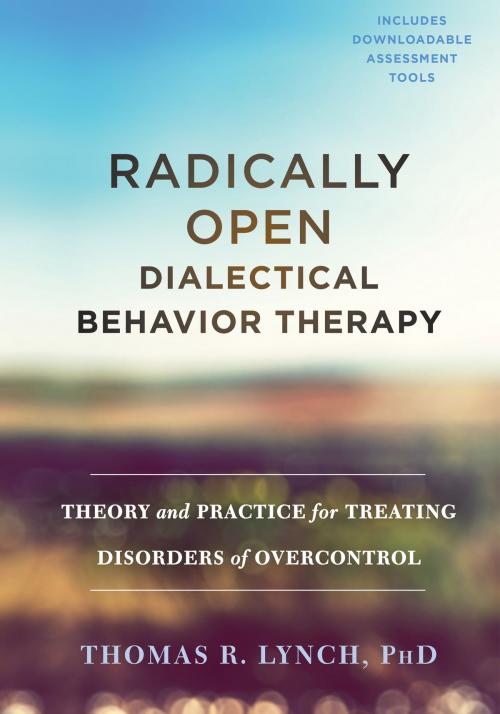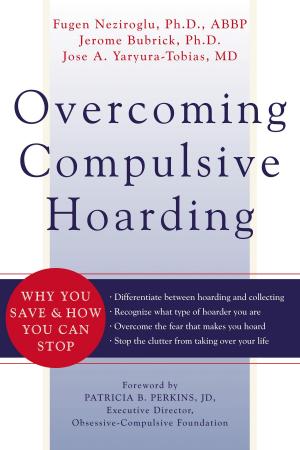Radically Open Dialectical Behavior Therapy
Theory and Practice for Treating Disorders of Overcontrol
Nonfiction, Health & Well Being, Medical, Specialties, Psychiatry, Psychology, Clinical Psychology, Personality| Author: | Thomas R. Lynch, PhD, FBPsS | ISBN: | 9781626259300 |
| Publisher: | New Harbinger Publications | Publication: | February 15, 2018 |
| Imprint: | Context Press | Language: | English |
| Author: | Thomas R. Lynch, PhD, FBPsS |
| ISBN: | 9781626259300 |
| Publisher: | New Harbinger Publications |
| Publication: | February 15, 2018 |
| Imprint: | Context Press |
| Language: | English |
Based on over twenty years of research, radically open dialectical behavior therapy (RO DBT) is a breakthrough, transdiagnostic approach for helping people suffering from extremely difficult-to-treat emotional overcontrol (OC) disorders, such as anorexia nervosa, obsessive-compulsive disorder (OCD), and treatment-resistant depression. Written by the founder of RO DBT, Thomas Lynch, this comprehensive volume outlines the core theories of RO DBT, and provides a framework for implementing RO DBT in individual therapy.
While traditional dialectical behavioral therapy (DBT) has shown tremendous success in treating people with emotion dysregulation, there have been few resources available for treating those with overcontrol disorders. OC has been linked to social isolation, aloof and distant relationships, cognitive rigidity, risk aversion, a strong need for structure, inhibited emotional expression, and hyper-perfectionism. And yet—perhaps due to the high value our society places on the capacity to delay gratification and inhibit public displays of destructive emotions and impulses—problems linked with OC have received little attention or been misunderstood. Indeed, people with OC are often considered highly successful by others, even as they suffer silently and alone.
RO DBT is based on the premise that psychological well-being involves the confluence of three factors: receptivity, flexibility, and social-connectedness. RO DBT addresses each of these important factors, and is the first treatment in the world to prioritize social-signaling as the primary mechanism of change based on a transdiagnostic, neuroregulatory model linking the communicative function of human emotions to the establishment of social connectedness and well-being. As such, RO DBT is an invaluable resource for treating an array of disorders that center around overcontrol and a lack of social connectedness—such as anorexia nervosa, chronic depression, postpartum depression, treatment-resistant anxiety disorders, autism spectrum disorders, as well as personality disorders such as avoidant, dependent, obsessive-compulsive, and paranoid personality disorder.
Written for mental health professionals, professors, or simply those interested in behavioral health, this seminal book—along with its companion, The Skills Training Manual for Radically Open Dialectical Behavior Therapy (available separately)—provides everything you need to understand and implement this exciting new treatment in individual therapy—including theory, history, research, ongoing studies, clinical examples, and future directions.
Based on over twenty years of research, radically open dialectical behavior therapy (RO DBT) is a breakthrough, transdiagnostic approach for helping people suffering from extremely difficult-to-treat emotional overcontrol (OC) disorders, such as anorexia nervosa, obsessive-compulsive disorder (OCD), and treatment-resistant depression. Written by the founder of RO DBT, Thomas Lynch, this comprehensive volume outlines the core theories of RO DBT, and provides a framework for implementing RO DBT in individual therapy.
While traditional dialectical behavioral therapy (DBT) has shown tremendous success in treating people with emotion dysregulation, there have been few resources available for treating those with overcontrol disorders. OC has been linked to social isolation, aloof and distant relationships, cognitive rigidity, risk aversion, a strong need for structure, inhibited emotional expression, and hyper-perfectionism. And yet—perhaps due to the high value our society places on the capacity to delay gratification and inhibit public displays of destructive emotions and impulses—problems linked with OC have received little attention or been misunderstood. Indeed, people with OC are often considered highly successful by others, even as they suffer silently and alone.
RO DBT is based on the premise that psychological well-being involves the confluence of three factors: receptivity, flexibility, and social-connectedness. RO DBT addresses each of these important factors, and is the first treatment in the world to prioritize social-signaling as the primary mechanism of change based on a transdiagnostic, neuroregulatory model linking the communicative function of human emotions to the establishment of social connectedness and well-being. As such, RO DBT is an invaluable resource for treating an array of disorders that center around overcontrol and a lack of social connectedness—such as anorexia nervosa, chronic depression, postpartum depression, treatment-resistant anxiety disorders, autism spectrum disorders, as well as personality disorders such as avoidant, dependent, obsessive-compulsive, and paranoid personality disorder.
Written for mental health professionals, professors, or simply those interested in behavioral health, this seminal book—along with its companion, The Skills Training Manual for Radically Open Dialectical Behavior Therapy (available separately)—provides everything you need to understand and implement this exciting new treatment in individual therapy—including theory, history, research, ongoing studies, clinical examples, and future directions.















